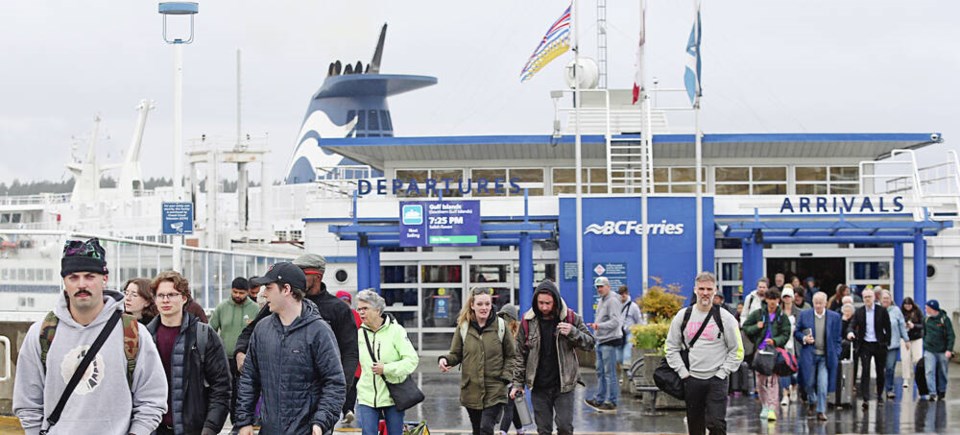The full story behind those short-notice sailing cancellations due to crew shortages that have plagued –°¿∂ ”∆µ Ferries for the past year or more is laid out in an independent commissioner’s report released Friday.
For travellers who count on the ferry system’s dependability, it’s a grim read. Commissioner Eva Hage, who oversees fare-setting and the financial performance of the publicly owned corporation, said labour shortages have prompted a significant increase in cancelled sailings — almost 700 over part of last year — “to a point where reliability of service has noticeably deteriorated.”
A shortage of skilled mariners, increased absenteeism, excessive overtime and high staff turnover are cited as reasons in the report. “Although the pandemic was a contributing factor, the scarcity of labour and increasing absenteeism were evident in the years leading up to the pandemic,” said Hage.
High inflation is putting pressure on wages. In a recent submission to the commission, –°¿∂ ”∆µ Ferries said an external review last fall found that compensation is significantly below market.
The corporation has responded with increased allowances for some officers, guarantees for peak-season casual labour, incentive payments and a decision to reopen collective bargaining with the ferry union this August, six months ahead of schedule.
The corporation is also adding a “substantial” number of management staff not directly associated with operations. They are mostly in the new “people and culture” department, formerly human resources.
Ironically, that department had its own staffing problems. It was determined earlier it was much smaller than it should be. The turnover rate there almost tripled in 2022 and an audit found numerous negatives associated with working there. The problems in turn hampered its ability to deal with the staffing crisis that was developing on the operational side.
Hage said –°¿∂ ”∆µ Ferries has “assumed” all the changes will make a difference, but has fallen short on identifying a plan as to when. Some Gulf Island sailings were cancelled this week, for example, because, as the corporation explained, “we have been unsuccessful in finding the required number of crew.”
Based on history, she warned the corporation must be vigilant on cost containment, particularly for unscheduled overtime and absenteeism.
The staffing crisis erupted during the pandemic, according to a –°¿∂ ”∆µ Ferries submission to the commission four weeks ago. Mandatory vaccinations prompted some people to leave and the corporation saw increased levels “in workforce anxieties and physical sick time, with an increased number of mental-health leaves, short-term disability claims and increased sick leave.
“Claims rose from an average of 200 any one time to more than 500.”
Complaints, misconduct cases, disagreements and departures increased, it said.
There was a difficult bargaining session in 2020 and there was substantive change in the ferry workers’ union.
–°¿∂ ”∆µ Ferries told the commissioner that turnover has increased steadily since the pandemic and is now 50 per cent higher than previously.
By early last year, the crew crisis made it clear that service during the peak summer season was going to be a challenge. So it reset service on major routes and dropped 220 sailings over the summer, about six per cent. But there were a further 679 further cancellations from April to November 2022 as a result of crew shortages.
The problem is one of several issues that have to be factored into a new four-year performance term for the contract between –°¿∂ ”∆µ and the ferry corporation. Hage’s responsibility is to review all the factors and set the maximum allowable fare increase that will be allowed.
On Friday, she issued a preliminary ruling that the cap will be 9.2 per cent a year.
But the number has been overtaken by a decision the government made about using its budget surplus: $500 million was directed to –°¿∂ ”∆µ Ferries expressly to alleviate fare pressures and keep fare hikes to a maximum of three per cent. Hage said the terms and conditions have not yet been disclosed, so she won’t include it until the final determination later.
The commissioner determined that –°¿∂ ”∆µ Ferries must implement more demand management in order to defer capital spending and become more sustainable.
Examples include extending reservations to all minor routes, not just some, and more demand pricing, where fares vary according to traffic peaks.
But the big issue is finding and retaining crew, during a time of high inflation, when the prospect of working for the corporation isn’t as attractive as it once was.
>>> To comment on this article, write a letter to the editor: [email protected]



